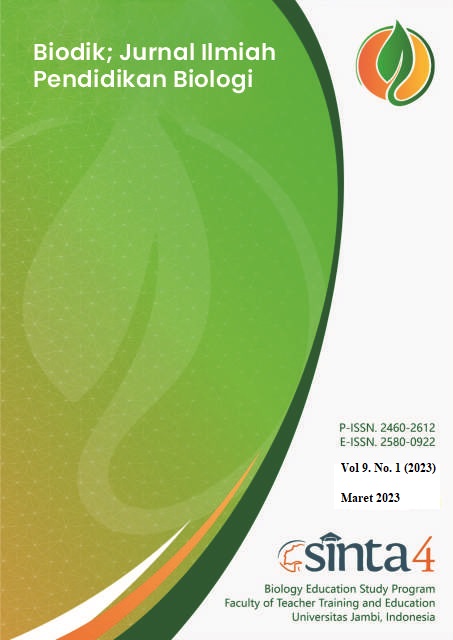Penerapan Project Based Learning (PJBL) untuk Meningkatkan Hasil Belajar Siswa Kelas XII IPA 1 SMA Negeri 2 Percut Sei Tuan Pada Materi Gen
(Implementation Of Project Based Learning (PJBL) To Increase Learning Outcome Of Students Of Class XII IPA 1 SMA N 2 Percut Sei Tuan In Gen Materials)
DOI:
https://doi.org/10.22437/bio.v9i1.19187Abstract
The implementation of education, a student must be able to master the class and educate students to change, especially mastering learning. However, not a few teachers are indifferent to the way of teaching and the results obtained by their students. Educators generally use methods that make students often feel bored so that the subject matter is easily forgotten so that this can affect the learning outcomes of a student. The purpose of this research activity is to determine the effectiveness of the project-based learning model in improving the learning outcomes of class XII IPA 1 SMA N 2 Percut Sei Tuan on gene material. The method used is experimental research with the research population of students of SMA N 2 Percut Sei Tuan and the research sample is 40 students of class XII IPA 1. The results of individual learning mastery are seen as indicators of success. In the first cycle, the first meeting obtained individual learning completeness of 32.5%, then the second meeting was 65%. In the second cycle, the third meeting was 75%, then the fourth meeting was 85% with a score of 75. The results of the research prove that student learning outcomes can be increased effectively by applying the Project Based Learning model.
Key words: Implementation, Project Based Learning, Learning Outcomes, Gene
Â
ABSTRAK
Pelaksanaan pendidikan, seorang tenaga didik tentu harus mampu menguasai kelas dan mendidik para peserta didik untuk berubah terutama menguasai pembelajaran. Namun, tidak sedikit guru yang acuh tak acuh terhadap cara mengajar dan hasil yang diperoleh oleh peserta didik nya. Pendidik umumnya memakai metode yang membuat peserta didik kerap merasakan jenuh sehingga materi pelajaran mudah dilupakan begitu saja sehingga ini dapat mempengaruhi hasil belajar seorang peserta didik. Tujuan dari kegiatan penelitian ini untuk mengetahui efektivitas model pembelajaran project based learning dalam meningkatkan hasil belajar dari siswa kelas XII IPA 1 SMA N 2 Percut Sei Tuan pada materi gen. Metode yang digunakan adalah penelitian eksperimen dengan populasi penelitian siswa SMA N 2 Percut Sei Tuan dan sampel penelitian yaitu siswa kelas XII IPA 1 sebanyak 40 orang. Hasil ketuntasan belajar individual dilihat sebagai indikator keberhasilan. Pada siklus I pertemuan ke-1 memperoleh ketuntasan belajar individual sebesar 32,5%, kemudian pertemuan ke-2 sebesar 65%. Pada siklus II pertemuan ke-3 sebesar 75%, kemudian pertemuan ke-4 sebesar 85% dengan nilai ≥ 75. Hasil penelitian membuktikan bahwa hasil belajar siswa dapat meningkat secara efektif dengan penerapan model pembelajaran Project Based Learning.
Kata kunci: Penerapan, Project Based Learning, Hasil belajar, Gen
Downloads
References
Alghany, et al. (2021). Pengaruh Model Project Based Learning terhadap hasil belajar siswa di Sekolah Dasar. Jurnal Basic Edu, 5(1), 327-333.
B. Baron. (1998). Doing with Understanding: Lesson from Research of on Problem-and Project-Based Learning. Journal of the Learning Sciences, Vol 7(3&4), 271-311.
Fitria, Y. (2018). Progressive Interview Learning Model as Innovation in Improving Student Literasy. International Journal of Language and Literature, 2(1). https://doi.org/10.23887/ijll.v2i1.16092
Hutasuhut, S. (2010). Implementasi Pembelajaran Berbasis Proyek (Project-Based Learning) untuk Meningkatkan Motivasi dan Hasil Belajar Mata Kuliah Pengantar Ekonomi Pembangunan. Pekbis Jurnal, 2(1), 196-207.
Indriyani, D., Desyandri, D., Fitria, Y., & Irdamurni, I. (2019). Perbedaan Model Children’s Learning In Science (CLIS) dan Model Scientific Terhadap Hasil Belajar Siswa pada Pembelajaran Tematik Terpadu di Sekolah Dasar. Jurnal Basicedu, 3(2), 627–633.
Nakada, A,. Kobayashi, M., Okada, Y., Namiki, A., & Hiroi, N. (2018). Project Based Learning. Journal of Medical Society of Toho University. https://doi.org/10.14994/tohoigaku.2017-010
Sudjana, Nana. (2004). Dasar- Dasar Proses Belajar Mengajar. Bandung: Sinar Baru Algensindo.
Sugiyono. (2011). Metode Penelitian Pendidikan. Bandung: Alfabeta.
The George Lucas Educational Foundation. (2005). Instructional Module Project Based Learning. Diakses pada Tanggal 02 Juni 2022 dari http://www.edutopia.org/modules/PBL/whatpbl.php
Trianto. (2011). Model Pembelajaran Terpadu. Jakarta: Bumi Aksara.
Trianto. (2012). Mendesain Pembelajaran Inovatif–Progesif. Jakarta: Kencana Pernada.
Wena, Made. (2009). Strategi Pembelajaran Inovatif Kontemporer: Suatu Tinjauan Konseptual Operasional. Jakarta: Bumi Aksara.
Downloads
Published
How to Cite
Issue
Section
License
Copyright (c) 2023 Nabilah Syahirah Azhari, Habibah Hanun Simangunsong, Izra Aulia Almi Hrp, Nurhani Afdilani, Indayana Febriani Tanjung

This work is licensed under a Creative Commons Attribution-NonCommercial-ShareAlike 4.0 International License.
Copyright Notice
Authors who publish with Biodik : Jurnal Ilmiah Pendidikan Biologi agree to the following terms:
- For all articles published in Biodik : Jurnal Ilmiah Pendidikan Biologi, copyright is retained by the authors and grant the journal right of first publication with the work simultaneously licensed under a Creative Commons Attribution-ShareAlike 4.0 International Licensethat allows others to share the work with an acknowledgment of the work's authorship and initial publication in this journal.
- Authors are able to enter into separate, additional contractual arrangements for the non-exclusive distribution of the journal's published version of the work (e.g., post it to an institutional repository or publish it in a book), with an acknowledgment of its initial publication in this journal.
- Authors are permitted and encouraged to post their work online (e.g., in institutional repositories or on their website) prior to and during the submission process, as it can lead to productive exchanges, as well as earlier and greater citation of published work (See The Effect of Open Access).
















